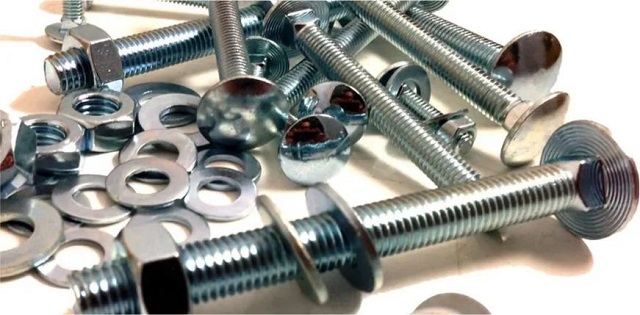On September 22, 2023, the Indian Ministry of Commerce and Industry issued a notice of initiation of an anti-dumping investigation on fasteners originating from or imported from China. The dumping investigation period for this case is from April 1, 2022, to March 31, 2023 (12 months), and the injury investigation period is from April 1, 2019, to March 31, 2023.
What are the products involved?
The products involved in this anti-dumping case include, but are not limited to, screws, bolts, nuts, rivets, concrete nails, C-rings, springs and clips, industrial staples, steel strip seals, plastic tacks, cable clips, bulk nails, steel nails and staples, bed linen consumables, steel nails, clips, rivets, and staples, among others. This case involves products under Indian customs codes 73170013, 73170019, 73181110-73181190, 73181200, 73181300, 73181400, 73181500, 73181600, 73181900, 82074090, and 83059010.
Looking at the products involved, it's not just fasteners but also includes products like nails and staples, making the scope quite extensive. So, what's the reason behind India's strong "anti-dumping" measures?
India's Long-standing Grievances Regarding Chinese Fasteners
India is one of the important producers of fasteners worldwide. It's reported that there are over 10,000 fastener manufacturers in India. In recent years, with the influx of high-quality and affordable Chinese fasteners, the domestic fastener industry in India has faced significant challenges. This year, the Indian domestic fastener industry has taken a series of measures to limit the import of Chinese fasteners in order to protect its local industry.
In March of this year, the Fastener Manufacturers Association of India (FMAI) proposed implementing a quality control order and imposing anti-dumping duties on Chinese imported fasteners at its 50th-anniversary celebration. In May, FMAI signed an agreement with high-end machinery manufacturers in Taiwan to introduce new machines from Taiwan to counter competition from China. In July, following repeated appeals from FMAI, India's Ministry of Commerce and Industry included fasteners under the Mandatory Quality Control Order (QCO). Only fastener products complying with Indian standards will be allowed to be imported, and this quality control order will come into effect on January 21, 2024. The relevant details are shown in the table below.
In September, India finally initiated an anti-dumping investigation against Chinese fasteners. Based on India's actions this year, we can see that India is gradually and systematically restricting the import of Chinese fasteners. Therefore, while this anti-dumping investigation may seem sudden, it was somewhat expected.
The Subsequent Impact of Anti-dumping Measures
India is one of the important export markets for Chinese fasteners. According to data from the General Administration of Customs of China, from January to June 2023, China exported fastener products worth $185,646,276 to India, an increase of 8.11% year-on-year, ranking seventh in the list of Chinese fastener export markets.
Due to differences in customs tariff numbers between India and China, it is estimated that the affected fastener market is valued at around $400 million using products under Chinese customs code 7318. If anti-dumping duties are imposed, it will be another significant blow to Chinese fastener exports.
How Can Chinese Companies Respond?
According to Indian anti-dumping regulations, interested parties should submit information related to the investigation, such as the questionnaire on stakeholder interests, to the investigating agency of the Indian Ministry of Commerce and Industry within 30 days from the date of issuance of the notice of initiation, or transmit the notice of initiation to their country's diplomatic representative for submission to the investigating agency. If involved companies do not actively respond, they may face high anti-dumping duties, potentially resulting in the loss of the Indian market. Therefore, domestic companies concerned should take this case seriously and make necessary preparations promptly.
To assist companies in effectively dealing with this case, the China Council for the Promotion of International Trade, Machinery Sub-Council, and the Fasteners Sub-Council will hold a coordination meeting for responses on October 8th (Sunday) morning via an online video conference. During the meeting, information about the case will be presented, opinions from enterprises will be heard, the case will be analyzed, and related arrangements and deployments for the next steps will be made. Relevant companies can make preparations in advance, and Huawang will closely monitor the further progress of the case.
If India is lost, where is the new market?
Southeast Asia is adjacent to both China and India and is also an important export market for Chinese fasteners. Within the Southeast Asian market, Vietnam and Thailand hold significant shares. Indonesia, as the largest economy within ASEAN, has a smaller share in comparison. With a population of over 276 million, Indonesia has enormous market potential. Furthermore, in recent years, Indonesia has been vigorously developing its infrastructure, and in 2022, it officially initiated plans to move its capital. The demand for fasteners in Indonesia in construction, transportation, and other sectors is expected to increase. Customs data shows that Indonesia imported a total of $590 million worth of fasteners in 2022, with China's share accounting for about 21.3%. This means that there is still a substantial market waiting for Chinese enterprises to explore in Indonesia.


